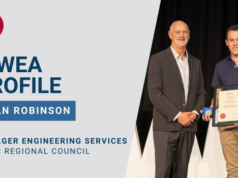When Richard Threlfall began his career in infrastructure, issues of sustainability were not a big priority.
Over the last few years, however, they have become vitally important to Threlfall, even as he focuses on how to support mega-projects such as Indonesia’s ambitious new capital of Nusantara on the island of Kalimantan, the rebuilding of Ukraine and high-speed rail projects in Europe and the US.
“I haven’t spent my entire career in sustainability but I guess I’ve come to an understanding over the last five or six years as I got closer to the work of the IPCC and the climate science, and I realised the world really is in a very, very perilous position,” says Threlfall, who is currently based in London as the Global Head of Infrastructure, Government and Healthcare for KPMG.
“And it concerns me to think that a huge proportion of the population is oblivious to that or feel that they have no particular traction to be able to do anything about it.
“And also that a large part of the population that does have something they could do about it are not necessarily prioritising it.”
Threlfall, who will be a keynote speaker at IPWEA’s International Asset Management Congress on the Gold Coast in June, has had a 30 year career in infrastructure which began as a civil servant in the UK Department of Transport in the road, rail and aviation directorates.

Between 1996 and 1998 he was Private Secretary to the Secretary of State for Transport and the Deputy Prime Minister, and then moved to the Infrastructure Advisory team at Citigroup before joining KPMG in the UK, where he led the UK Infrastructure, Building and Construction sector until 2018.
As sustainability has become more of a global priority, it has increasingly guided Threlfall’s career direction. From 2020 to 2022 he was Global Head of KPMG IMPACT and launched the firm’s Global ESG Strategy.
“I see infrastructure being the foundation of civilisation,” he says.
“I mean, almost everything that we do and see from the moment we wake up in the morning is underpinned by infrastructure.
“You turn the lights on in your apartment, it’s infrastructure. You go to school, it’s infrastructure.
“If we didn’t have infrastructure we would still be subsistence farming, but the added dimension on top of that now is the recognition that infrastructure isn’t environmentally sustainable, particularly from a point of view of carbon emissions and that it’s actually contributing to a very large proportion of the problem that the world is facing.”
Today, Threlfall’s role is factoring sustainability into the management of infrastructure mega-projects.
Where he was once largely involved in project finance for infrastructure, today his role is much more focused on governance, and this is where sustainable practices and frameworks can make a difference.
He makes the point that while infrastructure represents around 70% of the world’s carbon emissions this is also a major opportunity and puts professionals working in this area “on the front line of solving the climate crisis.”
“Anything that involves pouring a lot of concrete seems to have landed on my plate,” says Threlfall.
“And a lot of the work I do is around bringing private capital into these projects but now it’s more about governance and establishing the right environment for the project.”
In addition to governance, technology is also having an impact, not only in terms of materials but in preparation.
“Construction has suddenly woken up to a world where you can do so much off site,” he says.
“You can design in a digital environment and create digital twins of your project, even if it’s a city, before you start building it.
“You can understand how it might operate under certain conditions and variables well before you start wasting money on it, and you can build so much more efficiently today than you could ever do before.”
Threlfall equates the environmental emergency with a social emergency, with the two issues “completely interlinked.”
“We’ve already seen the world struggling to deal with levels of migration out of conflict zones and so on,” he says.
“But that’ll be nothing compared to what the world has to deal with if large parts of the world become uninhabitable, which is what the science is telling us will happen.
“That’s leaving aside issues like sea level rise and the risk of the irreversibility of some of the effects that we’re seeing, which means however clever humans might be, they might not be able to do anything about this in another 15 or 20 years’ time.”
Despite these fears, Threlfall describes himself as an “optimist”, pointing to the rapid momentum in areas such as the issuance of green bonds and sustainable investment practices as positive signs that the world is becoming serious about addressing these issues.
“I can see lots of sort of examples in history of tipping points, where you have a group that pushes and pushes for years or sometimes decades, and then suddenly things move very fast,” he says.
“You could look at the right of women to vote, or gay rights in recent years as examples of shifts in attitudes.
“And I feel like we are in the middle of this tipping point in the climate emergency.”
The world had gone, he said, from “a huge amount of ignorance” when the issue was not seen as a priority, to a point today where there was “almost no conversation” that did not include climate change as a theme.
“I think this could snowball very fast into a world in which the vast majority of the world’s capital, the vast majority of the world’s political effort, and hopefully the vast majority of the world’s business effort is directed towards fixing the climate emergency,” says Threlfall.
“And then I think if we move fast enough we will can manage to blunt some of the worst of what could be a very very serious position for the world.”














